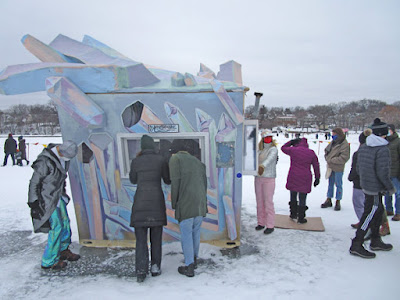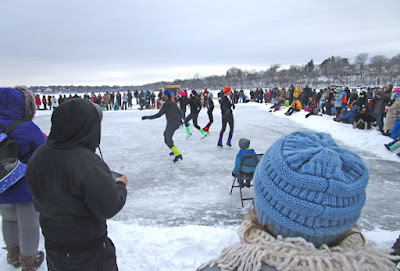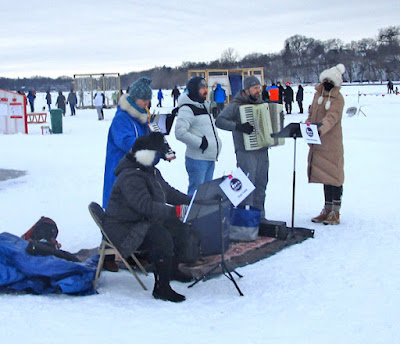I recently fetched a book being held for me at the Golden
Valley branch called
Icarus Fallen: the
Search for Meaning in an Uncertain World by the French intellectual Chantal
Delsol. (It can be interesting to explore what our brothers and sisters in Europe are
thinking about every once in a while.) In her opening salvo, however, Delsol
sketches the mood of the times with an unusually broad brush:
Western man at the beginning
of the twenty-first century is the descendant of Icarus. He wonders into what
world he has fallen. It is as if someone has thrown him into a game without
giving him the rules. When he asks around for instructions, he is invariably
told that they have been lost. He is amazed that everyone is content to live in
a world without meaning and without identity, where no one seems to know either
why he lives or why he dies.
I have gotten to know quite a few people in the United States and Europe over time, and I have yet to find
even one who matches that description. Perhaps it's an academic disease?
Yes, Delsol is a philosophy
professor at a university in suburban Paris. She is perhaps embarrassed to
acknowledge that if a significant proportion of the Parisian population feels
the way she describes, a half-century and more after Jean-Paul Sartre and
others popularized ennui, the reason might
be a simple one: the decline of metaphysics.
Metaphysics is the study of
elemental things: the one and the many, the parts and the whole, being and
non-being, identity and difference. In short, the whole ball of wax. The
elements involved are simple, but the reasoning patterns, for precisely that
reason, can be bizarre, and firm conclusions elusive.
I have never lost my enthusiasm for pondering
the BIG questions. One of the best places to ponder them, I've found, is with
Hilary, on the North Shore, under a starry sky, in the midst of the elements, with
a carefully selected stack of books sitting on the floor by the
fireplace.
At the top of my stack during our recent New
Year's trip were Chet Raymo's An Intimate
Look at the Night Sky, the late Robert Bly's My Sentence Was a Thousand Years of Joy, and a book called Metaphysics and the Idea of God by a
little-known German theologian named Wolfhart Pannenberg.
I brought Raymo up for the
star charts, but found the text, which I hadn't looked at closely for years, fit my mood, too. At one point, for
example, he brings up the classic question of Olbers' Paradox: If the universe
is infinite, why is the night sky dark rather than bright? Raymo seems to think
that the Big Bang Theory, about which Olber knew nothing in 1897, clarifies
everything." If the night sky is dark," Raymo argues, "it's because
the universe is young."
That makes no sense at all. Most
astrophysicists agree that the stars are shooting away from one another at
unimaginable speed. If so, then I would imagine that as everything gets farther
and farther apart, the universe will grow darker still. In fact, the Big bang
Theory would seem to suggest that the universe is NOT infinite but finite, which would shoot a big hole in Olbers' Paradox from the get-go.
These aren't, perhaps, the kind of things you think about when you're standing in the dark under the starry firmament in deep winter, but they are the stuff of metaphysics. Perhaps we could take things a
step further and suggest that the concept "infinity" is a human construct
created by mathematicians and other speculative thinkers. They draw our attention to the limits of particular things—the hem of a skirt or the edge of a
coffee table, for example—and then say, "Now imagine something that
has no edges but goes on forever."
When we imagine such things, what
we tend to see is deep dark outer space. There might be an edge out there, but
probably not; and if there is, we'll never see it, even with the new Webb
telescope. And if we do catch a glimpse of that edge, there's no telling if something
lies beyond that edge or not.
In short, infinity is a fiction.
But it's an alluring one that answers to something deep within our selves, and
the night sky brings that connection to the surface. That may be why Plato reasoned that the stars are
individual souls twinkling in perpetuity.
We stopped at Sax-Zim Bog on our way up to Castle Danger, ate a late lunch at the Wilbert Cafe in Cotton, and came into Duluth via Highway 53. We drove through the UMD campus on Skyline Parkway, missing a few
turns along the way, and caught several
glimpses of Lake Superior far below us, with the pink-orange light of the
setting sun sweeping across it, highlighting the patchwork pattern of open
water, smooth and shiny, interspersed with the dull, rough stretches of
floating ice and slush.
The stars were spectacular that
first night. The brightest I've seen in years. No moon, no clouds, and little
ambient light beyond a single yard-light well down the road. Above us Orion,
Taurus, the Pleiades, Sirius, Capella, blazing in the midst of an intense blue-black screen. With the help of binoculars we also spotted the Beehive Cluster and
Andromeda without difficulty.
We went out again the next
morning. Still pitch black. It's interesting to see Leo directly overhead, and
Cassiopeia upside down, an elongated M on the horizon to the northwest. The frigid air
clarifies everything and makes the stars appear more intense.
During the ten minutes we were
out, I saw two shooting stars. It's the Quadrantid Meteor Shower!
But on our second day the wind
came up, the clouds rolled in, and the waves got fierce. Out came the
books. Opening the Bly collection I came upon this gem:
Loafing with Friends at Ojo
Caliente
Mineral pools
remember a lot about history.
Here we are at
Olo Caliente, sitting together,
soaking up the
rumble of earth's forgetfulness.
Why should we
worry if Anna Karenina ends badly?
The world is
reborn each time a mouse
Puts her foot
down on the dusty barn floor.
Sometimes ohs
and ahs bring us joy. When
you place your
life between the vowels, the music
Opens the doors
to a hundred closed nights.
People say that
even in the highest heaven
If you manage
to keep your ears open
You would hear
angels weeping, night and day.
The culture of
the Etruscans has disappeared.
So many things
are over. A thousand hopes
F. Scott
Fitzgerald had for himself are gone.
No one is as
lucky as those who live on earth.
Even the Pope finds
himself longing for darkness.
The sun catches
on fire in the lonely heavens.
This isn't metaphysics, but the juxtaposition of images may reach important zones of feeling in the same way that the
stars do. The kind of feeling that almost seems to drift into a cosmic understanding, or comfort.
Too often we read a poem
hurriedly. We get to the end and say, "I liked that, though I don't know
what it means," or "That was a dud." And move on. What are we
looking for? How is it possible to dwell
with a poem, line by line, collecting the vectors and the valences, as if to
generate, from such data, a new vision of the universe?
You can spend hours reading a
self-help book loaded with case histories, anecdotes, and sage words of advice.
Or you can read:
—the speed of the soul leaping
over fences
Brings the toe forward. At other
times, a book resting
On my chest takes me backward into
my mother's arms ...
By now, the baked potatoes must be
done, and the broccoli is stewing in its own dissipating steam.
______________
The next morning the air is warmer, but little else has changed:gray skies, high
winds, big waves. It's still dark outside, though I can see the branches of the
spruce tree bobbing up and down outside the window.
"A theological doctrine of
God that lacks metaphysics as its discussion partner falls into either a
kerygmatic subjectivism or a thoroughgoing demythologization—and frequently
both at the same time."
Good heavens. We wouldn't want
that to happen. And a few pages later:
"I am skeptical of the claim
that with the notion of highest perfection we have already reached the idea of
God. The idea of God, however construed, has a considerably higher specificity
... [It] cannot be separated from the elements of personality (however we are
to understand it) and of a will (whatever form it takes)."
I agree, though it all sounds a little vague. We're in the company of Wolfhart Pannenberg now, known to his friends as Wolfie. He seems to be on the
right track and is careful not to let the rhetoric become too seriously detached
from experience. And yet, he concludes one chapter:
"After all, it is for the
sake of the task—the task of achieving a comprehensive interpretation of the
finite world—that metaphysics attempts to rise above the multiplicity of the
finite toward to idea of the One, a one that grounds the unity of the world and
provides a unifying context for the multitude of things within the world."
Unity? The One? We ought to be suspicious of such concepts. Is that what anyone really desires? Not at all.
Unity is dull, oppressive, stultifying, and so all-absorbing as to squelch
personal identity and critical judgment alike. What we're looking for in the
midst of life's multiplicity isn't unity, but harmony, which is made up of nourishing interactions between things. Including, I suppose, the various
parts of ourselves.
______________
This afternoon we drove up to
Tettegouche State Park and hiked in to the bridge across the Baptism River
through spruce woods and aspen woods--a hike punctuated by a few meadow-like
openings with impressive views of distant peaks.
Back at the cabin, the waves
continued to roll in, maybe ten feet high, never really forming a pattern, gray
and dark, lumbering in, noisy and mesmerizing to watch from the windows. Here
comes a good one. And look, that one fractured in the middle, and the previous
wave, which showed great spread and promise thirty feet out from shore, has
ended up being a dud.
We evaluate the waves like
surfers, though almost every crash leads to dissatisfaction. There is no finality
to it! When the wind dies down it will take two days for the energy
gathered out on the lake to spend itself here on shore. Water foams or slithers
away across the rocks just as a new crest approaches. The process is endless,
and I suppose the incessant noise might put some people on edge, unlike the various
clicks and hums resounding at random intervals from the baseboard heating here inside.
A pine grosbeak sits in the snow
under the window; he's reappeared several times, working his way through the
shriveled berries in a mountain ash. Splashes of orange-red under the
wings and on the rump, and a little touch of elegant green on the head, but
mostly a lumpy gray—the avian equivalent of a manatee rather than a dolphin.
We take a walk down the road toward
the highway with the roar of the wind at our backs. Darkness is closing in. We've
heard coyotes howl along this road, but not tonight.
On the menu: spicy Thai chicken
meatballs braised in coconut milk.
We make the meat balls together,
brown them nicely in a beat-up frying pan. Now Hilary is at work at the kitchen
counter, chopping the cilantro. Back on the couch, I open a book by Ortega y
Gasset at random and read:
"Thoughts arise in the mind
spontaneously, without will or deliberation on our part, and without producing
any effect whatever on our behavior."






















